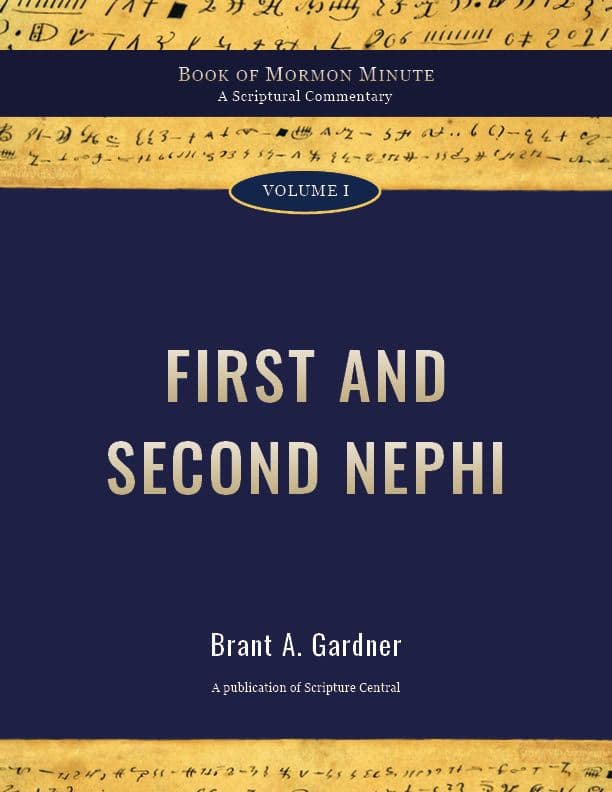Book
55 Chapters

Many ancient writers were faced with need to insert a later text into an earlier document, or perhaps to simply write an aside to the main text. To mark this inserted, out-of-line, text into their document, they used a technique that has been called repetitive resumption. The name is basically the description.
When faced with an inserted text, there are two important points. The first is the departure point in the original text. The second is the return to the original text. To mark the insertion, ancient authors would repeat important information from the departure text. The text in our chapter 6, verses 1-6 is the first example of the kind of typical insertion we will see often in Nephi’s writing, and later in Mormon’s.
A short example comes from Mormon’s abridgement of the book of Alma. In this section, Mormon is copying, and then inserts his own information that Alma didn’t need to write, because he already knew it. Mormon inserted it for his future audience:
13 And it came to pass when they had arrived in the borders of the land of the Lamanites, that they separated themselves and departed one from another, trusting in the Lord that they should meet again at the close of their harvest; for they supposed that great was the work which they had undertaken.
[The inserted text begins here]
14 And assuredly it was great, for they had undertaken to preach the word of God to a wild and a hardened and a ferocious people; a people who delighted in murdering the Nephites, and robbing and plundering them; and their hearts were set upon riches, or upon gold and silver, and precious stones; yet they sought to obtain these things by murdering and plundering, that they might not labor for them with their own hands.
15 Thus they were a very indolent people, many of whom did worship idols, and the curse of God had fallen upon them because of the traditions of their fathers; notwithstanding the promises of the Lord were extended unto them on the conditions of repentance.
16 Therefore, this was the cause for which the sons of Mosiah had undertaken the work, that perhaps they might bring them unto repentance; that perhaps they might bring them to know of the plan of redemption.
[The insertion ends, and the next sentence repeats the information from the story he copied from Alma]
17 Therefore they separated themselves one from another, and went forth among them, every man alone, according to the word and power of God which was given unto him.
Repetitive resumption occurs when an interrupted text resumes by repeating words, or meaning from the text just before the departure.
1 And now I, Nephi, do not give the genealogy of my fathers in this part of my record; neither at any time shall I give it after upon these plates which I am writing; for it is given in the record which has been kept by my father; wherefore, I do not write it in this work.
2 For it sufficeth me to say that we are descendants of Joseph.
3 And it mattereth not to me that I am particular to give a full account of all the things of my father, for they cannot be written upon these plates, for I desire the room that I may write of the things of God.
4 For the fulness of mine intent is that I may persuade men to come unto the God of Abraham, and the God of Isaac, and the God of Jacob, and be saved.
5 Wherefore, the things which are pleasing unto the world I do not write, but the things which are pleasing unto God and unto those who are not of the world.
6 Wherefore, I shall give commandment unto my seed, that they shall not occupy these plates with things which are not of worth unto the children of men.
When Nephi ended with his father examining the plates of brass, he spoke of Lehi’s genealogy and how it linked to Joseph. That lineage is important to Nephi, and as Nephi begins his next planned chapter, it occurs to him that some future reader might expect him to include that genealogy. He departs from his intended beginning to the next chapter, and discusses his writing process. He has moved out of his historical time and into his present time.
Nephi declares that he will not give the genealogy, as the essential point of the genealogy is to link the family to Joseph. This will be important as a support for Nephi’s kingship. However, Nephi realizes that he should emphasize his greater purpose. While he will craft a document that shows how he fulfills the prophecy that he would be a ruler and a teacher over his brethren, his main objective is to persuade men to come to Jehovah.
The insertion ends where Orson Pratt created a chapter break, at the end of verse 6, where Nephi speaks of the command he will give to those of his descendants who will write on the plates.
The repetitive resumption picks up in verse 1 of our chapter 7, where he repeats that Lehi had made an end of prophesying about his seed—the very thing which was the conclusion of the previous chapter. With our verse 1 of chapter 7, he is back on track. We should remember that there was no chapter break at this point.
Book
55 Chapters
Items in the BMC Archive are made publicly available for non-commercial, private use. Inclusion within the BMC Archive does not imply endorsement. Items do not represent the official views of The Church of Jesus Christ of Latter-day Saints or of Book of Mormon Central.